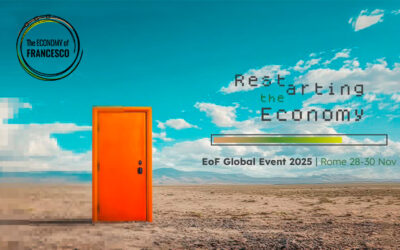 This experience began in 2012 with the first workshop titled: “Start up the Future”. The following year another workshop was held: “Planning Labour and Building the Future”; and this year’s workshop: “Being satisfied with your job”. The young people write: “This workshop encourages us to seek work that will not just satisfy our financial needs, but but will also permit us to develop our talents, initiatives and to live our work-life as a calling, in communion with workmates. It’s a horizon to look towards, a target to aim for. With the help of numerous experts and professionals we became more acquainted with the Economy of Communion (EoC) and examined the indissoluble link us and our work. The workshop was not only a training, but above all dialogue and growth as we reflected on our aspirations and on the importance of recognising our talents in order to be able to fulfill ourselves at work not so much as individuals, but members who belong to a community. Knowing the world of the EoC showed how much our small contribution can become much more significant and pleasing when it is shared along with the resources of others.
This experience began in 2012 with the first workshop titled: “Start up the Future”. The following year another workshop was held: “Planning Labour and Building the Future”; and this year’s workshop: “Being satisfied with your job”. The young people write: “This workshop encourages us to seek work that will not just satisfy our financial needs, but but will also permit us to develop our talents, initiatives and to live our work-life as a calling, in communion with workmates. It’s a horizon to look towards, a target to aim for. With the help of numerous experts and professionals we became more acquainted with the Economy of Communion (EoC) and examined the indissoluble link us and our work. The workshop was not only a training, but above all dialogue and growth as we reflected on our aspirations and on the importance of recognising our talents in order to be able to fulfill ourselves at work not so much as individuals, but members who belong to a community. Knowing the world of the EoC showed how much our small contribution can become much more significant and pleasing when it is shared along with the resources of others.  Professor Luigino Bruni reminded us: “working is never just holding some generic place in the world, but a fundamental exercise for understanding one’s place in the world” and, above all, that practising a profession means inserting oneself into a social network. Another important point was also highlighted; that is, the need to look towards an economy “with a soul,” one that centres on relationship. Between training sessions, workshops were offered that focused on: the content and the direct experiences of several EoC business owners and professionals in different fields of work; and self-knowledge through the exploration of personal talents that could be developed and put in common with the talents of others to provide a work experience that would not only be fulfilling for us, but also a contribution towards the common good. Those days together provided us an experience of communion. At a moment in history characterised by the crisis of our economic models, by distrust of institutions, and by individualism, activities such as these are able to instill new hope. But this hope has sprung from concrete examples, from the experiences of those who have stepped into play with an innovative economic model that includes and is based on the centrality of the human person, as well as the gift of the economy. It is a hope born from the very experience of these days together in which, by questioning ourselves and sharing our thoughts, we have turned a glance towards the future.” Flickr gallery
Professor Luigino Bruni reminded us: “working is never just holding some generic place in the world, but a fundamental exercise for understanding one’s place in the world” and, above all, that practising a profession means inserting oneself into a social network. Another important point was also highlighted; that is, the need to look towards an economy “with a soul,” one that centres on relationship. Between training sessions, workshops were offered that focused on: the content and the direct experiences of several EoC business owners and professionals in different fields of work; and self-knowledge through the exploration of personal talents that could be developed and put in common with the talents of others to provide a work experience that would not only be fulfilling for us, but also a contribution towards the common good. Those days together provided us an experience of communion. At a moment in history characterised by the crisis of our economic models, by distrust of institutions, and by individualism, activities such as these are able to instill new hope. But this hope has sprung from concrete examples, from the experiences of those who have stepped into play with an innovative economic model that includes and is based on the centrality of the human person, as well as the gift of the economy. It is a hope born from the very experience of these days together in which, by questioning ourselves and sharing our thoughts, we have turned a glance towards the future.” Flickr gallery
Look with pure eyes
Look with pure eyes




0 Comments